QuestionI just bought 2 sweetheart parrot fish for my 20 gallon tank and can't find any information on them at all! All I know is that they are very shy. So far they have been hiding in the corner next to the heater and only catch them swimming around when I turn the corner and reenter the room after being left alone for several hours. I realize that their environment is totally new and some fish take longer than others to adjust but I'm really concerned about these ones. Do you have any information about these fish? Can you lead me in the right direction to finding any info?
AnswerDear Amanda,
I'm sorry to say that you most certainly have bought "dyed" fish. Parrot fish themselves are a hybrid between two different species of fish. But those named 'Sweet heart' Parrot fish usually have been injected with a color to create very unnatural colorations. I've usually seen the sweetheart parrotfish with a heart painted on their sides. Which is really not good. This is because parrot fish are one of the many other of the large amount of fish targeted for artificial dying, among those are Oscars, glass fish, white skirt tetras, and even Cory catfish and others. The dyeing process is usually inhumane, involving taking the fish out of the water to restrain while the procedure is undertaken to inject the dye. When injecting the dye with a needle the fish has to endure many punctures to achieve the coloration or pattern.
There are other methods even worse, like dipping. When a fish is dipped in caustic solution to strip off their natural protective slime coat, then the fish is dipped in a dye or injected with a dye and then dipped again in a chemical that irritates the fish's skin and stimulates the return of the natural slime coat. As you already know by now these methods of coloring fish are very cruel and unnecessary. There is a large mortality rate among dyed fish and those lucky fish that do survive it suffer weakened immune systems. Another thing is usually the dye they have been injected or dipped with won't last forever and will fade overtime. Fortunately some areas in the UK have been working on banning the practice or selling of dyed fish.
Now I am certainly -not- blaming you or being harsh. I would understand if you didn't realize your parrot fish were dyed because I, myself had bought dyed fish before without knowing it. Now that I do know, of course I avoid it above all. If you would like more info on dyed fish and the problems with it, please visit-
"http://www.deathbydyeing.org/home.htm"
And you may like to visit-
"http://www.practicalfishkeeping.co.uk/pfk/pages/show_article.php?article_id=72"
I know this isn't a nice subject to start out a reply letter with. But I just wanted to help spread the word about dyed fish.
I do love Parrotfish. In my experience they are highly owner responsive fish who enjoy being handfed and rarely if ever disturb other fish. But like many fish similar to them, when they are moved to a new aquarium and new surroundings, they will do their best to hide and often sulk in the aquarium for days. I don't know why, but it seems the dyed parrotfish do this more than the natural colored ones. Just to be sure, it would be great if you could test your water for any ammonia or nitrites present and make sure the nitrate level isn't too high. Ideally ammonia and nitrite should always be -Zero- and nitrate 20 or less. As always, when in doubt be sure to do at least a 30% water change with your gravel vacuum of course. And insure the replacement water is equal in temperature to that of your aquarium and insure it is dechlorinated with a good water conditioner everytime. Parrot fish are like many cichlids, they have a hard time adjusting to new surroundings, and can be especially shy if there aren't any other fish swimming around to make them feel like it's safe. Basically if a shy fish sees a group of bold fish actively swimming around he/she thinks that it must be safe for them to come out too. But if they see no fish around, they may suspect that a predator might be lurking about and it's unsafe to come out. This may not make much sense and we haven't been able to personally ask the fish if this was the case. :) But I have found that it is true if a group of bold and active fish are added to an aquarium where there are shy and frightened fish, they will sometimes instantly feel more at ease and start coming out more and more and accepting food. I know of several species of 'bold' fish you could add to your aquarium to make your parrots feel better. But I really need to know if your aquarium has cycled or 'established' yet. In case you don't know, cycling means to establish special beneficial bacteria that colonize in your gravel bed and filter and they are the ones who eliminate ammonia and nitrite and turn it into nitrate which is safe for fish unless at high concentrations, traces of ammonia or nitrites is dangerous for fish and if your aquarium hasn't cycled then ammonia or nitrite could be present in your water and this will make fish very, very sick or worse. It's very easy to test your water for these levels with a simple test kit from a petstore.
If ammonia or nitrite is above safe bounds, an immediate 30-50% water change is in order.
(But make sure if your aquarium hasn't had a water change in a while to only do small partial water changes--perhaps 20%. A large water change could put your fish into shock if they haven't have very many frequent water changes. But if they do get frequent consistant water changes, a 50% water change wouldn't harm them at all)
If you are certain your aquarium has cycled and there are no ammonia or nitrites present. You could add a small group of Black skirt tetras, or other larger tetras like Head and Tail-light Tetras, Congo tetras, Rosy Barbs and similair fish. Just be sure to have a group of at minimum 6 of any of these fish since they must be in schools. I also keep my Parrotfish with Cory catfish, Lemon tetras, Rainbowfish, Angelfish, and even Zebra danios...
Another thing I would like to mention is Parrot cichlids have the potential to grow quite large. I currently own a parrot cichlid (undyed of course) who is nearing 6 inches and is a very large fish in overall body size. Be sure to keep this in mind that your current 20 gallon aquarium is really only a temporary home for your parrots. And if they are cared for well they will quickly outgrow it and be needing something along the lines of a 40-50 gallon aquarium.
Parrot fish are really easy to care for. They pretty much have the basic needs of most all fish. They must have clean water by means of frequent at least twice a week water changes of 30% (but this depends on your individual situation) a good quality diet especially while young, parrot fish need plenty of food variety and usually have to be hand-fed at each feeding because of the unusual shape of their mouth makes it where they cannot bite at food like other fish can and often they won't get their fair share at feeding times. Most parrots will take all foods, when small they can be feed all manner of dry foods like flakes and pellets. High-quality cichlid pellets pre-soaked in a cup of tank water before feeding are excellent. As well as high quality flakes, other types of sinking pellets or tablets, freeze dried foods like krill or shrimp, and frozen foods of all kinds are eagerly taken. Make sure to soften freeze-dried foods and completely thaw frozen foods before feeding.
And of course a good temperature for parrotfish is much the same as other fish-- 78-80F is fine. A good quality filter helps keep their water clean and well oxygenated also, the best kind of filter I have found is the hang-on-the-back (also known as HOB) power filters. Most all brands are very good these days. But Cascade, Regent, and Emperor are very efficient.
Well, I really hope this helps! If you would like to read more about Parrot fish, please visit this website-
"http://www.geocities.com/parrotcichlid/main.html"
-And-
"http://parrotcichlid.com/"
Best wishes to you and your fish and feel free to write again with anymore concerns!
Karen~

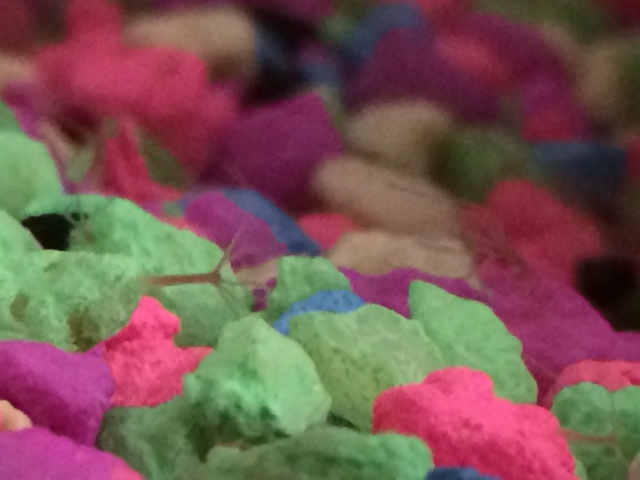 Whats in my tank?!?
Question
Squirming thing Squirming thing
T
Whats in my tank?!?
Question
Squirming thing Squirming thing
T
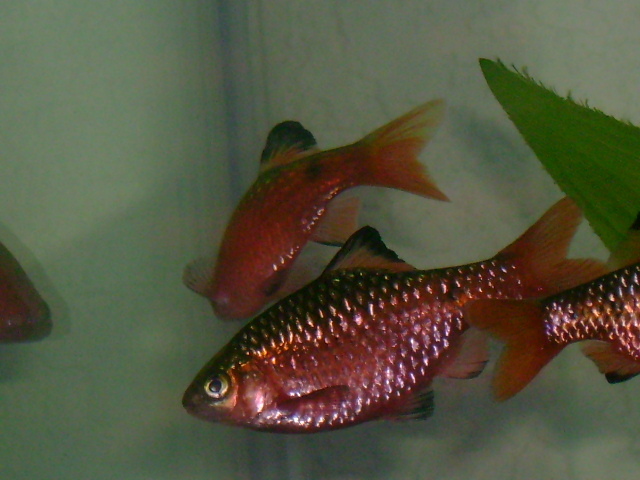 unknown fish
Question
Unknown Fish
I got 3 fish from a friend, but d
unknown fish
Question
Unknown Fish
I got 3 fish from a friend, but d
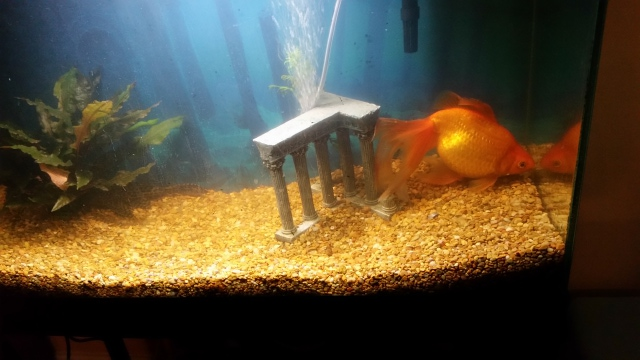 White spots and water issues
Question
Goldfish
I have 2 fish, 1 large fancy g
White spots and water issues
Question
Goldfish
I have 2 fish, 1 large fancy g
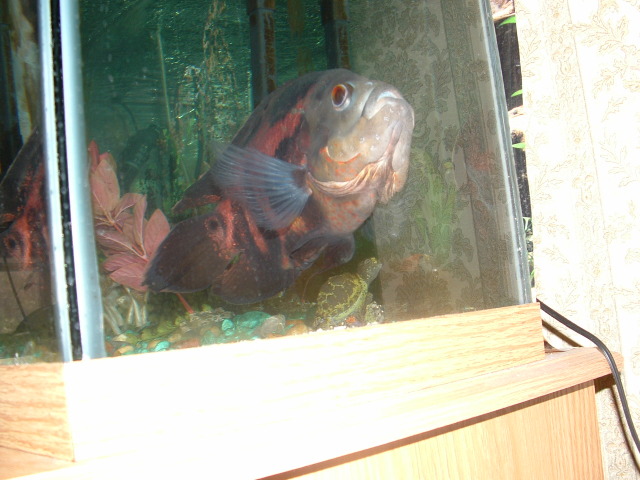 high nitrites Oscar mouth opening and closing
QuestionQUESTION: You have helped me before. I HAVE A 7
high nitrites Oscar mouth opening and closing
QuestionQUESTION: You have helped me before. I HAVE A 7
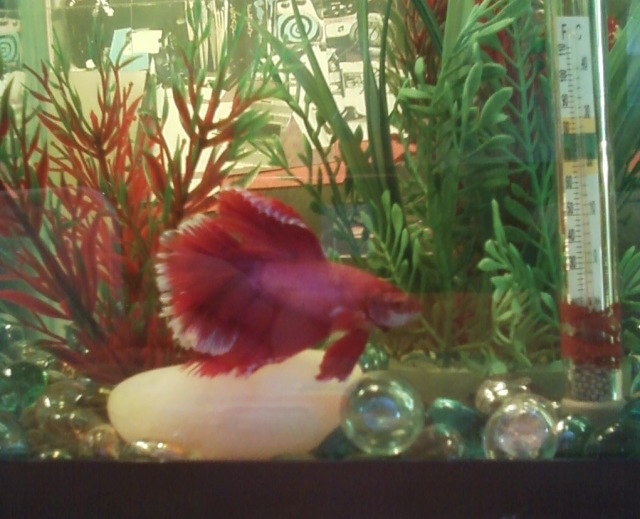 Half-Moon Tail Beta
QuestionPhillip
QUESTION: I have a Half Moon Tai
Half-Moon Tail Beta
QuestionPhillip
QUESTION: I have a Half Moon Tai